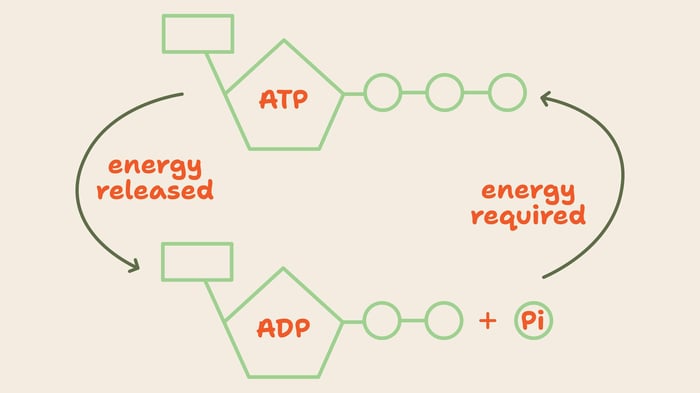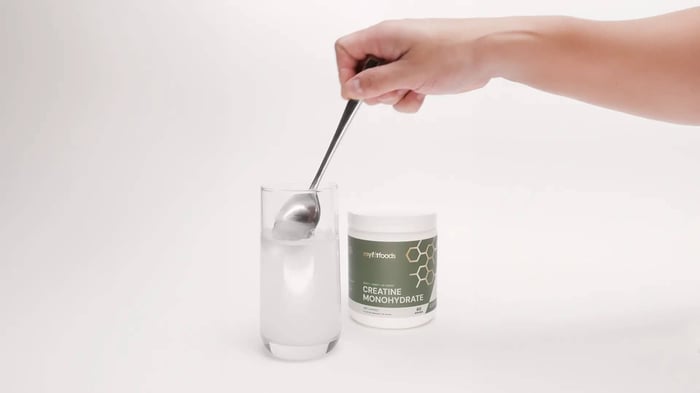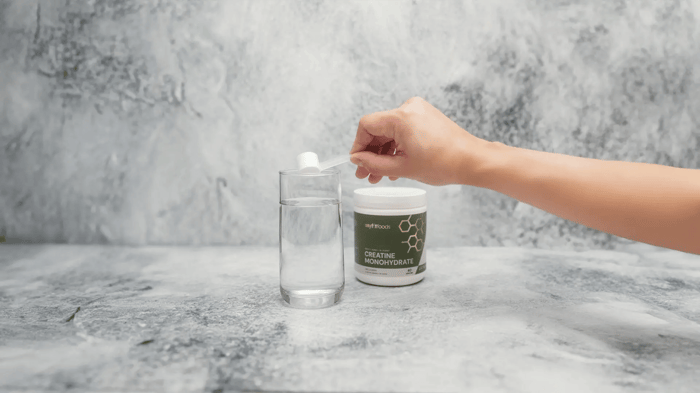A Gym Supplement That Lifts More Than Just Weights.
Creatine is known as a staple in the fitness world, appropriately praised for its ability to boost performance and power.
However, recent research reveals that its benefits may extend beyond the gym.
For nearly 20 years, MyFitFoods has been committed to keeping you ahead of the curve in the world of fitness and nutrition, because after all, we’re not just a healthy meal company, we’re your partners in total wellness.
In conjunction with the recent launch of our MyFitFoods creatine product, we’ll explore a new study reinforcing what a decade of research has suggested: creatine isn't just a sports supplement. It's a promising tool for improving cognitive health, notably in those struggling with depression.
What Is Creatine?
Creatine is a compound composed of three amino acids: Glycine, Arginine, and Methionine. Together, these amino acids create creatine stores in the body, supporting muscle function while aiding in energy production and metabolism. Approximately 95% of the body's creatine is stored in skeletal muscle, while the remaining 5% is found in the brain and other tissues. (1)
Natural Sources of Creatine
Most people obtain creatine from seafood, red meat, and eggs. However, getting creatine through regular eating can be challenging for many. It's important to try and get the maximum amount of daily nutrients from food and avoid relying on supplementation. At MyFitFoods, we advocate only a very short list of supplements, and creatine is definitely on that list. Some say the same amount of creatine that is in one 5g scoop would be the equivalent of eating almost 3 lbs. of meat. (2) The liver, pancreas, and kidneys also produce about one gram daily.
How Creatine Works in the Body
We generate energy with ATP (Adenosine Triphosphate), the currency our cells use to power essential functions like thinking, digestion, and muscle contraction. When ATP is spent, it loses a phosphate molecule, becoming ADP. Creatine helps recharge ADP back to ATP, ultimately ensuring muscles maintain a steadier energy supply.

Traditional Uses of Creatine
Creatine is best known for boosting muscle performance, improving strength, muscle mass, and body composition. A daily intake of 5–10 grams of creatine monohydrate is shown to increase muscle stores, enhancing strength and sustaining power at higher intensities for longer intervals of time.
In 2018, the International Society of Sports Nutrition called creatine:
"The most effective ergogenic supplement for increasing high-intensity exercise capacity and lean body mass." (3)
Put simply, creatine has been shown to reliably improve energy output, helping achieve athletic goals faster. However, in recent years, its use cases and supplementation benefits have expanded beyond muscle-building.
Understanding Depression
Depression is a common mental disorder affecting an estimated 5% of adults worldwide (4). It is characterized by persistent sadness and disruptions in basic functions such as thinking, sleeping, and eating.
While traditionally attributed to a chemical imbalance, particularly a serotonin deficiency, emerging research points to impaired brain metabolism as another contributing factor in its development. This shift in understanding opens the door to alternative approaches in treatment, including the potential role of creatine.
What Happens in the Brain During Depression
Depression doesn't just affect mood. It physically alters the brain. Neuroimaging studies reveal that individuals with depression often show a reduction in gray matter volume in key areas such as the:
Hippocampus – Crucial for memory formation and decision-making, the hippocampus can shrink in response to prolonged stress, a common factor in depression.
Amygdala – This small region processes emotions such as fear and anxiety. In people with depression, the amygdala becomes hyperactive, intensifying emotional responses.
Prefrontal Cortex – Responsible for higher-order functions like planning, judgment, and self-control, this region often shows reduced activity and volume in depressed individuals.
How Depression Is Treated Today
Current treatments for depression typically involve therapy and/or pharmaceutical interventions.
Cognitive behavioral therapy (CBT) helps individuals identify and change unhealthy thoughts and behaviors.
Antidepressant medications, like SSRIs (selective serotonin reuptake inhibitors), alter brain chemistry to help alleviate symptoms.
Oftentimes, a combination of these treatments is employed to provide relief. As demonstrated in the studies below, the augmentation of creatine to these treatment protocols can be shown to help.

Creatine with CBT, Study One
A study published this year, Efficacy and safety profile of oral creatine monohydrate in add-on to cognitive-behavioral therapy in depression (5), explored whether creatine supplementation could enhance the effects of CBT for depression.
Over eight weeks, 100 participants (50 men and 50 women) were randomly assigned to two groups:
CBT + 5g creatine monohydrate daily
CBT + placebo
How Depression Was Measured
Researchers used the PHQ-9 questionnaire, an industry standard diagnostic tool for screening depression, categorizing symptoms as such:
5–9 = Mild depression
10–14 = Moderate
15–19 = Moderate to severe
20+ = Severe
Average starting scores:
Placebo group: 17.6
Creatine group: 17.8
(No significant difference at baseline)
Study Results after 8 weeks:
Placebo group: 11.9 (moderate depression)
Creatine group: 5.8 (borderline mild/no depression)
Takeaway of the Creatine and CBT Study
Both groups showed improvements in depression symptoms. However, those taking creatine experienced significantly greater reductions in symptoms compared with the placebo group. These results strongly suggest that creatine may be a powerful addition to traditional therapies.
That said, MyFitFoods strongly maintains that creatine is not an adequate replacement for therapy or medication.
Creatine with SSRI, Study Two
A 2017 study, An Open-Label Pilot Study of Combined Augmentation With Creatine Monohydrate… (6), explored whether creatine supplementation could help treat women with major depressive disorder (MDD) who had not responded to standard antidepressants like SSRIs.
Conducted over eight weeks, 15 adult women continued their current antidepressant medication while receiving additional daily supplements of 5 grams of creatine monohydrate. The researchers measured outcomes using a standardized rating scale called the HAM-D.
The Hamilton Depression Rating Scale classifies the severity of depression as follows:
0-7: No depression
8-12: Mild depression
13-17: Mild depression
18-24: Moderate depression
25-52: Severe depression
Results after 8 weeks of daily creatine:
66.7% of participants achieved a 50% reduction in HAM-D scores.
46.7% achieved remission, meaning a HAM-D score of 7 or lower.
“Mean HAM-D scores declined from 18.9 at pretreatment visits to 7.5, a decrease of 60%.”
It's important to note this study was small (15 participants) and lacked a placebo control group. Nevertheless, these findings echo the first study, suggesting that creatine may offer a safe and effective supplementation strategy for people suffering from depression.

The Emerging Consensus on Creatine
Creatine has long been recognized for its role in enhancing physical performance, but its potential benefits to mental health are becoming harder to ignore.
As research continues to uncover the connection between brain energy metabolism and depression, creatine emerges as a promising supplement for both the body and the mind. While never a substitute for professional treatment, it may serve as a valuable complement to existing therapies as explored in the literature above.
MyFitFoods readers well know that there are no shortcuts on the lifelong journey of health. As the science around nutrition and wellness evolves, we will continue to share the tips and insights that enhance the strong foundation of daily habits we advocate for:
healthy eating
hydration
movement
rest
Why? So you can live your best life because that's what you deserve.
If you're curious about unlocking the benefits of creatine, MyFitFoods is proud to offer a high-quality creatine supplement to support your performance and wellness goals.
Did you enjoy this blog? If so, please do us the honor of sharing it with a friend.
Always consult with a healthcare provider before adding new supplements to your routine.




